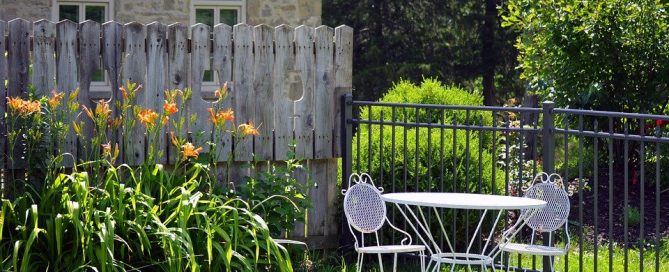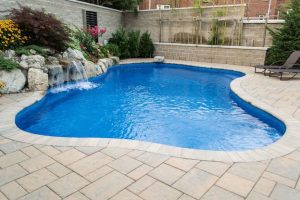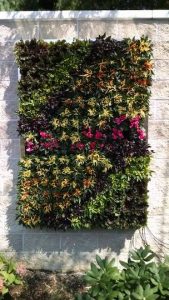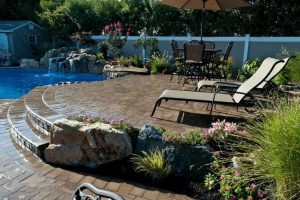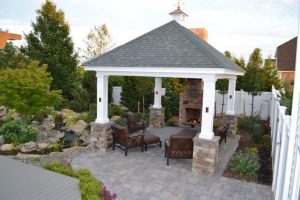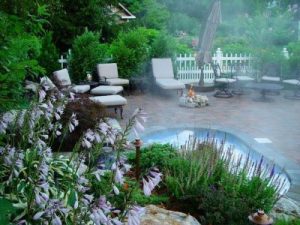How Can I Add Privacy to my Backyard?
Backyard upgrades can create a wonderful escape — a place to relax and forget about everything. But a lot of homes in our New York Metro and Long Island areas are situated in tightly packed neighborhoods.
So often we hear the question: how can I add some privacy to my backyard?
1. Adding a Wall or Fence
Here’s a great example of living in a cramped neighborhood. The home of these Deck and Patio clients is in the heart of Queens, a borough of New York City. Their property is tightly surrounded by apartment buildings, traffic, and noise.
In such a city atmosphere, even adding the pool and patio they wanted couldn’t offer all the escape they desired. For a real backyard oasis, we had to shut out noise and the oppressive atmosphere.
In addition to a lovely waterfall to help with the noise, we designed/built a 12-foot-high concrete block wall.
“While a wall like that is truly useful for privacy as well as a noise barrier, it can be overwhelming in itself,” says Dave.
So the next challenge was to soften the wall’s appearance. One thing great about interior and exterior walls is they make an ideal canvas.
“First, we planted bamboo around its perimeter,” says Dave. “Bamboo can be invasive so we encased the woody grass with concrete blocks to limit spreading.”
We also designed and supervised the layout of a “living wall” that can hold multiple-sized pots for plants.
When completed, the living wall became living art — changing in color and shape almost daily.
The result: the clients may live in a busy part of New York City, but during outdoor living season every spare moment is spent in blissful leisure right in their own backyard.
For a second example of dressing up a fence or a wall, for these homeowners color and texture were really important.
Although their neighbors had a natural wooded area they got to enjoy, by adding their own bushes, trees and plenty of plantings, birds and their songs came closer to them and easier to watch and hear.
The crepe myrtles Deck and Patio planted, for example, are lovely in summer and contribute to an extended picture-perfect landscape season — they bloom from August through October, providing a haven for a variety of visiting birds and creating charming focal points in front of the fencing.
2. Pavilions
Sometimes, a fence and even bushes aren’t enough when, as you can see from this photo, neighboring homes are multi-storied. This is when a pavilion or a gazebo gives that extra bit of privacy.
Open to breezes and the scents of blooming flowers, but shut to the sky’s burning rays or drizzling rain, pavilions offer both shelter and aesthetic appeal, in addition to privacy.
Even though we added a fireplace, with modern technology, Deck and Patio was able to add built-in heating to the pavilion, that with a flip of a switch, will warm up the interior so they can enjoy a truly extended outdoor season.
Can I get Privacy without a Fence?
Yes, and we have a great example. This property was open on three sides, in full view of four homes. “And the clients wanted a ‘spool’ — or a cross between a small pool and a spa — but the best spot for it was in a very exposed area,” says Dave.
Most clients want privacy when in a spa or pool but not all want structures changing the feeling of a space. For a truly natural appeal, Deck and Patio’s landscaping design team used Skip Laurels, Leyland Cypress, and Cedars to create an attractive natural privacy screen around the spool.
In addition, texture and color were brought in to the buffering divider by incorporating flowering deciduous shrubs.
“We also incorporated creeping evergreen ground covers to cascade and wind over and between the rocks we installed,” says Dave. “Plus a careful selection of plants provides the area with color from April through October. The whole design flows beautifully into the back property.
Another simple way is to just add large bushes or trees in containers and place them close together.
Privacy in possible for most backyards. It sometimes a little creative thinking, but at Deck and Patio we believe it’s almost always doable.

